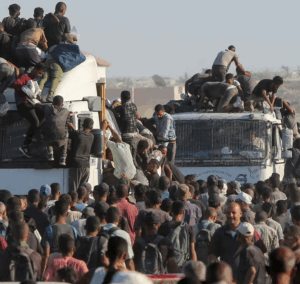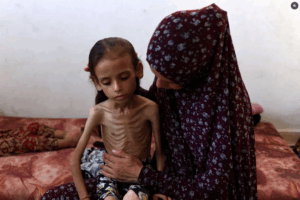‘Survival of the strongest’: Gaza looters wreak havoc as aid seekers remain empty-handed

Palestinians seeking aid climbing onto trucks in Khan Yunis on 4 August 2025
Nagham Zbeedat reports in Haaretz on 5 August 2025:
In the battered southern edge of the Gaza Strip, Um Balsam sits inside a tent stitched together from plastic sheets and worn-out blankets, torn between two impossible choices: whether she should send her 15-year-old son to one of the chaotic Gaza Humanitarian Foundation distribution points, where hundreds have been killed, or let her children go hungry.
Once a resident of Khan Yunis, Um Balsam, a mother of six in her mid-thirties, fled to Al-Mawasi’s coastal area after Israeli forces pushed deep into southern Gaza. Her husband was killed early in the war, leaving her as the sole provider for their children. Now, with food dwindling and cash virtually non-existent, she finds herself in a grim reality where survival depends not just on what little aid trickles into the Strip, but on who can get to it first.
Reaching the aid isn’t the only challenge. For months, Gaza’s desperate residents have described how looters intercept and steal humanitarian supplies, reselling them at inflated prices that most can’t afford. Often armed, Palestinians in Gaza tell Haaretz that while some are organized in gangs, many of the looters are unaffiliated, everyday civilians who have “lost their moral compass.”
“Some people are left to starve while others steal and resell the stolen aid,” Um Balsam told Haaretz. “By God, we’re craving flour, and there are people who steal it and sell it.” Her voice trembles with anger and fatigue as she describes how women – especially single mothers and widows like herself – are all but absent from the scenes of aid drops. “We simply can’t reach those areas. It’s too violent, too chaotic and too dangerous. Only the strong or well-connected get through,” she says.
As aid convoys are swarmed, and at times looted, the very lifeline meant to ease Gaza’s humanitarian crisis has become yet another source of risk and inequality. On July 26, the IDF announced it would create “humanitarian corridors” and allow aid to be airdropped into the Strip. Yet aid workers say the reality of the famine in Gaza has barely changed. “There’s a little more food, but it’s a drop in the ocean,” UNICEF Deputy Spokesman Ricardo Pires told Haaretz earlier this week. “Not enough trucks get in, and what enters is looted.”
When something is scarce for months, and then it enters in a trickle, supposedly to prevent Hamas from stealing – you’re handing thieves the perfect excuse to steal. You’re creating the market for it.
For many like Um Balsam, the question is no longer when aid will arrive, but whether it will be stolen before it reaches them, and whether they are willing to risk their lives to try and get it. On top of her daily struggle to feed her family, Um Balsam is caring for her 3-year-old daughter, named Balsam, who suffers from a heart condition. Before the war, the toddler was receiving treatment at the Sheba Medical Center near Tel Aviv. But since October, all of Um Balsam’s requests to evacuate her daughter for medical care have been denied. With medications and medical supplies largely barred from entering Gaza, the girl is left to suffer without treatment.
Um Balsam attempts to ease her daughter’s pain with small comforts: sweets, milk or anything she craves, but even these efforts often end in failure. “The hardest thing a mother can go through is when her child cries from hunger, and you have to tell them to drink water and sleep instead,” she says.

Nine-year-old Mariam Dawwas, a child suffering from malnourishment, and her mother in a displacement camp in Gaza City on 3 August 2025
‘More lethal than bombs and bullets’
Because she cannot leave her daughter alone, Um Balsam often sends her other children to watch over their sister while she walks for hours in search of affordable food. One such journey nearly cost her life. When the U.S. and Israeli-backed GHF announced a designated day for women and children at one of its sites, Um Balsam went, hoping to find milk for Balsam. The crowd was massive, and the outcome tragic.
“The scenes there were straight out of an action movie. Children screaming, bodies on the ground,” she recalls. “I thank God a thousand times that I was able to leave alive, even if I came back empty-handed.”
Women sifting through sand in search of legumes or rice that fell out of airdropped aid packages in central Gaza earlier today.Credit: Eyad Baba/AFP
After that day, she vowed not to return, nor to risk sending any of her children. “It’s humiliating,” she says. “Aid is a basic right, not a gift.”
Talking about aid looters and how the theft of supplies meant to be distributed freely is deepening the suffering inside the Strip, Um Balsam is sure “it is more lethal than bombs and bullets.”
As the majority of residents are too afraid or unable to reach the aid trucks, she explains, many men and youngsters resort to jumping on them and grabbing whatever they can carry back to their homes and tents. Scenes like this are visible in footage from GHF sites filmed by Anthony Aguilar, an American contractor who shared the videos with Haaretz and other media outlets.
“Stealing is haram, and nothing can justify it,” Um Balsam says, using the Muslim term for something that is forbidden. “But many of those people who steal are also unable to find a crumb of bread to feed their family, so they resort to stealing.” Still, not all the thieves are driven by desperation. “Merchants of war follow no god or religion,” she adds bitterly. “They steal food not because they need it to feed their families, but to sell it to us, for money we don’t even have.”
‘It’s the Hunger Games. Exactly that’
Um Balsam’s story is just one of many in Gaza, where survival now hinges not only on evading bombs but on navigating hunger, grief and moral dilemmas unimaginable to most. In Gaza City, 22-year-old Hadi carries a different but equally heavy burden. After losing his father before the war, he became the sole provider for his mother and younger sisters.
Hadi sits silently in the rubble of what used to be his home in Gaza City. The echoes of another aid airdrop rumbling in the sky above northern Gaza is audible over the phone. But unlike the thousands who rush toward every falling bundle of hope, Hadi doesn’t move. He’s done chasing food. “I’ve gone on many occasions,” he says. “But it’s a risk I won’t take again.”
After nearly two years of war, loss and hunger, Hadi carries more than just the physical weight of survival. He bears the emotional burden of providing for his mother and sisters alone after his father was killed. “Sometimes I just want to die, for this pain to ease,” he admits, “but I can’t leave my mother and sisters alone in this life.”
Now, his only wish is silence, peace of mind and quiet, both within and around him. But even the skies won’t allow it. Aerial aid drops spark chaos, he explains. “Stabbing, fighting, shooting, a murder scene. It’s the Hunger Games. Exactly that.”
“Ninety percent, if not more, of the ones stealing aren’t doing it out of need,” he says bluntly. “They go for the expensive stuff. They open the aid boxes and take the sugar, cooking oil, dates, tahini and tomato paste – the high-price items in the market – and leave behind lentils, chickpeas and canned goods that aren’t worth much. If someone really needed it, they’d take the whole box. But these people don’t.”
There are exceptions, he acknowledges – those who take a single flour sack or a carton of food and rush home, trying to avoid the violence. “They’re the lucky ones,” he says. “And the unlucky? They’re on their knees scraping flour from the dirt, because the thieves ripped the bags open to stuff their own sacks with the valuable items.”
Hadi doesn’t hesitate when asked how he feels toward these looters: “They’re traitors. And according to law, religion and custom, they deserve punishment. But no one is willing to confront them.”
It’s not just individuals on the ground, either. “Even truck drivers are stealing,” he says. “Just a few days ago, I was walking with some friends, and we stopped near a house in a red zone, one of those no-go areas. The Sahm Unit [a Hamas security squad tasked with maintaining order in Gaza] were stopping aid trucks that had already been looted, forcing the drivers to show what they were hiding. One guy was caught with 100 boxes of halva sweets stashed in his cab. Each box is worth 170 shekels.”
A makeshift tent camp for displaced Palestinians in Gaza City on Sunday.Credit: Jehad Alshrafi/AP
Still, Hadi draws a distinction between those who steal to eat and those who exploit. “I can’t call someone who hasn’t eaten in days a thief,” he says. “Yes, they’re part of the crisis, but not the core of it.”
He traces the issue back to early March, when prices began to spike. “When something is scarce for months, and then it enters in a trickle, under aerial protection, supposedly to prevent Hamas from stealing – you’re handing thieves the perfect excuse. You’re creating the market for it.”
Hadi’s hopes more aid will be let in through land crossings regularly, since “if enough trucks enter without interruption for just a month, prices will crash.”
‘We were whispering our final goodbyes’
Abu Abdullah, a 42-year-old father of five, has made multiple attempts to reach aid distribution points across Gaza. “I only managed to reach a few times, and it was because I had no other choice. I had to gamble with my life to feed them.”
On his most recent trip to an aid site in the Netzarim corridor, Abu Abdullah spent days waiting for aid to arrive. “Sometimes young men wait 12 hours, even 18, under heavy gunfire, hoping the trucks will finally be let in,” he says. “Drones hover overhead. At times they drop gas bombs or shoot, it’s terrifying.”
When aid finally comes, often just a handful of trucks for thousands, chaos erupts. “Everyone runs, people scream, there’s no clear path,” he says. “I was running blindly in the dark, trying to reach the trucks, and I hit a metal pole sticking out of a cement wall” in the ruins of what was once a Palestinian home. The metal pole pierced through his legs, and he broke his arm.
That night, he says that the IDF ambushed him and a dozen other aid seekers waiting near the distribution site. “Israeli tanks surrounded us from three sides, we were laying flat on the sand, whispering prayers and our final goodbyes thinking we won’t make it.” He returned to his family injured and empty-handed. “Despite my injuries, my cries were because I had nothing to give my kids. That pain was worse than the injury.”
At the distribution points, Abu Abdullah has witnessed “a dangerous group of people” that take advantage of the chaos. “They either take part of the aid that someone got, or steal it entirely. They don’t care if you’re poor, injured or struggling.”
Abu Abdallah and others opt to take riskier routes to avoid encountering these armed groups; some are “walking extra four or five kilometers just to avoid crossing paths with them,” he says, “It’s the survival of the strongest out there, and for some, the strength is being misused.”
This article is reproduced in its entirety
